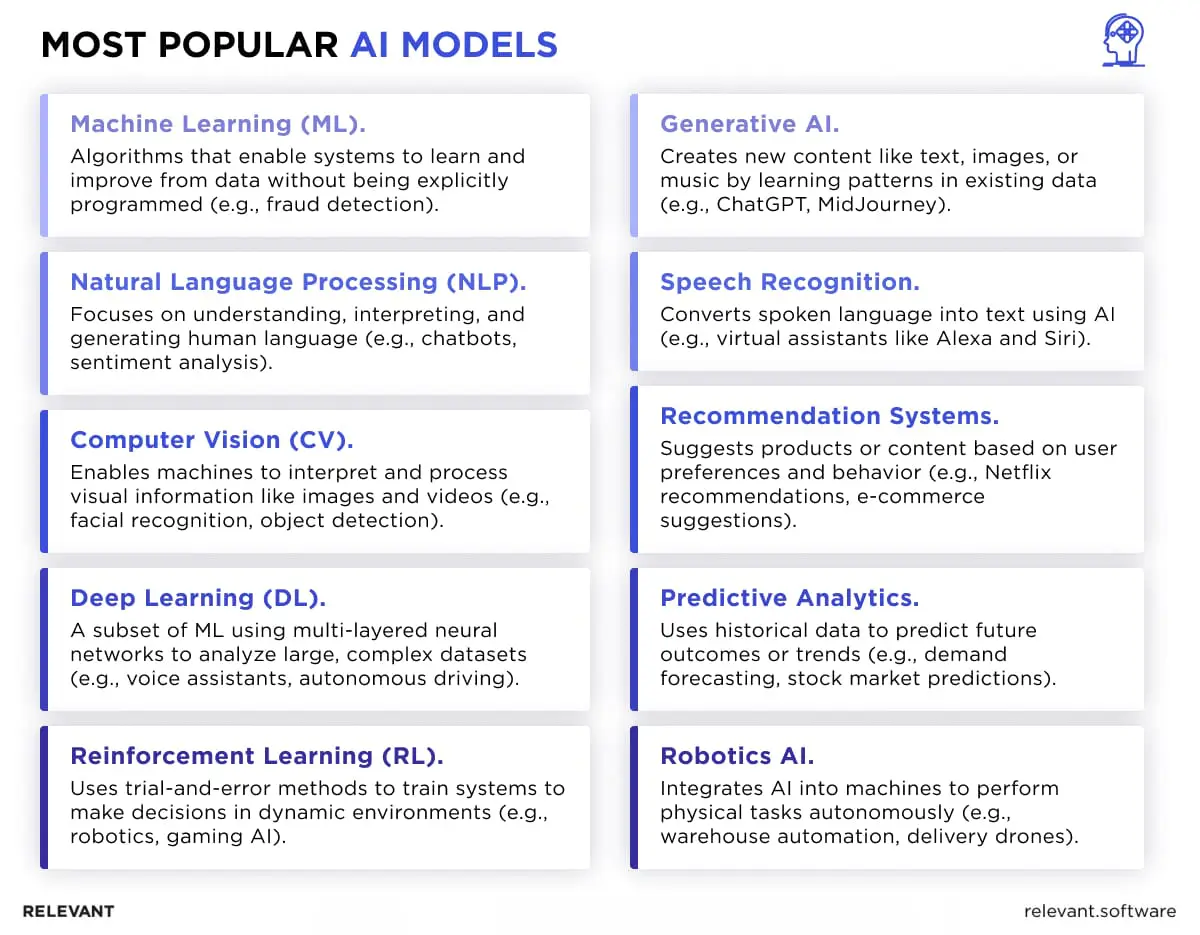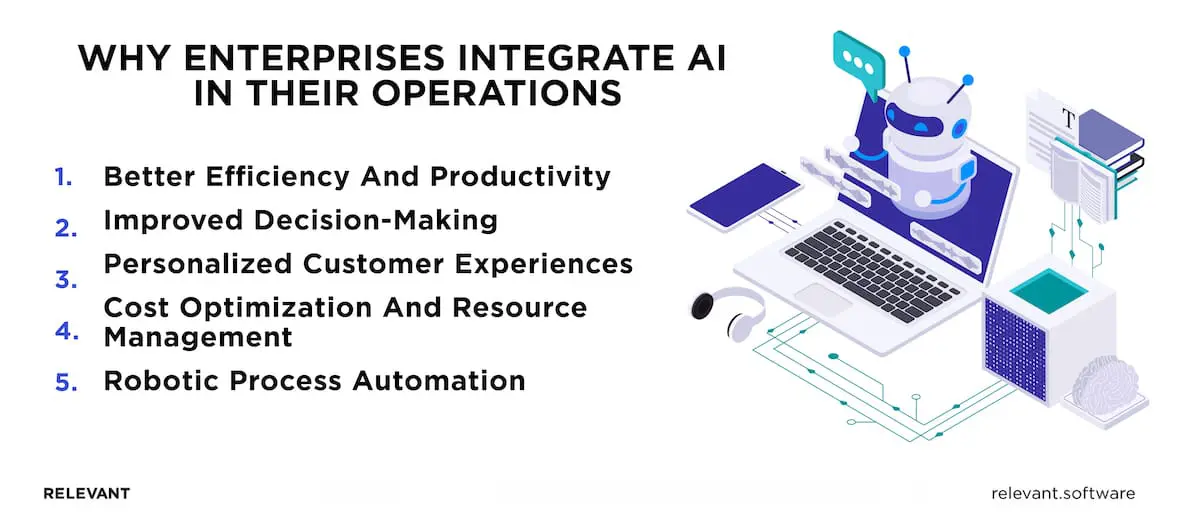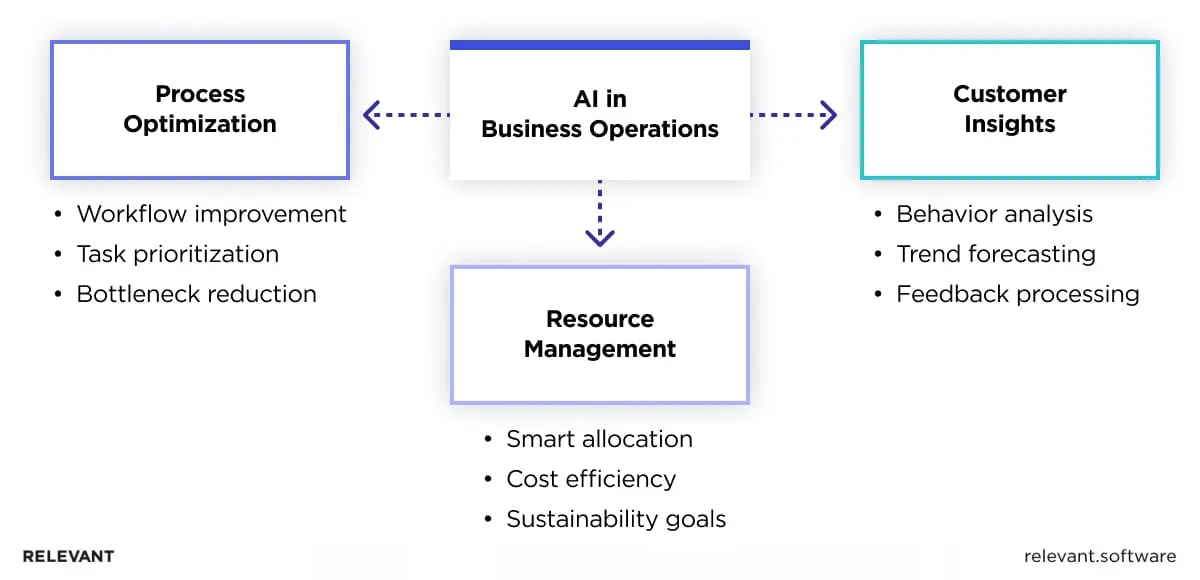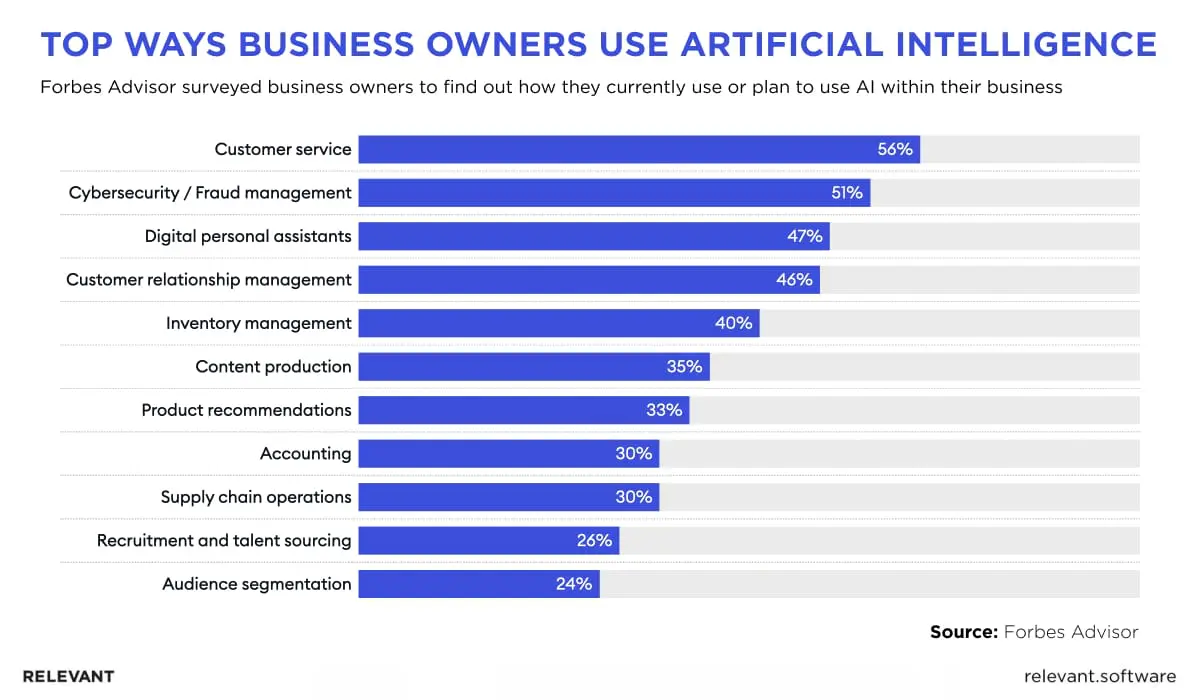AI Integration: Unlocking Business Potential Through Smart Technology

If you notice that your competitors are pulling ahead but can’t figure out how the answer might lie in two simple words: AI integration. In fact, it’s a new trend in the business world right now. Thanks to a number of open-source and free-to-use AI solutions, we believe there are few people who haven’t used or at least heard about OpenAI ChatGPT, or MidJourney, a little-known technology that became a household name in about 2 years. The key point here is that companies saw the real value and role of artificial intelligence in doing business.
Yet, successful AI implementation is rarely a DIY project. It requires expertise, a well-thought-out strategy, and often the support of an experienced AI software development company to explore and understand the complexities of different AI and ML algorithms. To help entrepreneurs who are in doubt about integrating AI into business, we decided to clarify the opportunities it offers. The sure way to make the right decision is to learn what is AI integration, examine several use cases of artificial intelligence, and evaluate the risks, which Relevant Software’s experts are going to review in this guide.
from 25 countries outsourced software development to Relevant
We provide companies with senior tech talent and product development expertise to build world-class software.
What is AI integration?
To keep it simple, AI integration is the inclusion of artificial intelligence capabilities into your business operations or products to solve concrete problems or achieve better efficiency. In other words, AI takes what your business already does well and amplifies it with data-driven intelligence.
AI’s true strength lies in its capacity to learn from data and be adaptive. It’s not tied to one industry or task—you can teach it to manage virtually any job. The thing is, AI’s performance depends to a greater degree on the quality of the data it receives. The more data (quality data) it has, the better it performs. And honestly? Gathering enough quality data is often the trickiest part of the process.
We also want to emphasize that there are different types of AI models that fit different purposes. Got a mountain of data to process? Machine learning is what you need. Want to predict trends? Predictive analytics models are the answer. Looking for chatbots that actually understand your customers? Natural language processing (NLP) is the genius of making it all come to life.

So why should you care? Because businesses today aren’t just competing on price or quality—they’re competing on how intelligently they operate. Over the past three years, companies leading in AI adoption have outpaced their peers with 1.5 times faster revenue growth, 1.6 times higher returns for shareholders, and 1.4 times greater ROI, as states BCG. Apart from the financial wins, these companies show exceptional results in patents filed and employee satisfaction.
Key benefits of AI integration for businesses
What if the secret to outpacing your competitors wasn’t just about what you sell but how you operate? The truth is AI’s biggest impact isn’t in flashy support tools—it’s in the heart of your business. Companies, among which are Relevant Software clients, using AI in business, particularly in their core operations, are capturing 62% of its value and pulling ahead of the pack. So, how exactly AI implementation can benefit your business?

Increased efficiency and productivity
Let’s face it—allocating human resources and time to repetitive, low-value tasks today in the era of smart technology is counterproductive. Artificial intelligence integration takes the load off your team’s plate. From Relevant Software’s experience, tools like AI-driven CRM systems can handle lead tracking and follow-ups, while workflow automation streamlines backend processes: invoice generation, data entry, employee onboarding, document approvals, email scheduling, and more. When these time-consuming tasks are performed by AI, your team’s productivity soars, and employee morale improves.
Improved decision-making with data-driven insights
Making decisions relying solely on intuition is risky, especially when you possess mountains of business and customer data, which just needs to be thoroughly interpreted. Relevant Software’s AI engineers believe that the key is to use data properly, and integrating AI in business will help you extract meaningful information from your data. Predictive analytics enables businesses to predict customer patterns or market shifts so they can stay ahead of the curve. It allows you to learn what your customers want before they do—that’s the kind of edge AI-powered insights can give you.
Personalized customer experiences
Have you ever got an email from a brand that seemed so personal and about you that it’s hard to believe it wasn’t written just for you? That’s one of the AI’s superpowers. Around 58% of companies think that artificial intelligence is capable of creating personalized experiences for their customers and see it as one of the major benefits.
The working mechanism behind AI-driven product suggestions is simple: AI uses all the data available about customer behavior (past purchases, browsing history, etc.) to figure out the products and services the customer is more likely to be interested in.
Cost optimization and resource management
Another incredible AI advantage, according to Relevant Software’s AI specialists, is that it can help businesses save money and use their resources more wisely. The intelligent system driven by ML algorithms can find areas or processes where it’s possible to cut costs without sacrificing quality. Similarly, it improves resource allocation through predictive modeling and demand forecasting.
Look at FedEx. They’ve tapped into AI to find the fastest, most efficient delivery routes while staying informed on packages in real-time. And they don’t stop there—they’re rolling out drones, robots, and even self-driving delivery vehicles to make those last-mile deliveries smoother and cheaper.
Competitive advantage
Businesses that embraced AI earlier already show impressive results that outpace their competitors, whether it’s through smarter operations or standout customer experiences. Retailers are predicting trends before they hit, healthcare providers are improving patient care, and manufacturers are optimizing production—all thanks to AI business integration. If you’re not using AI to stay ahead, your competitors probably are.

Industry-specific use cases of AI integration
As we mentioned above, AI is an industry-agnostic technology, which means you can tailor it to fit your particular business needs. In this section, based on Relevant Software’s experience, we offer you to discover how artificial intelligence is applied in different sectors.
Healthcare
Healthcare has a lot of ineffective, bureaucratic processes associated with patient management that can be fixed with AI-powered solutions. Appointment scheduling, medical record management, follow-up reminders, and other admin tasks take much of a doctor’s valuable time to handle. Automation is one of the benefits of AI in healthcare that allows you to spend more time on patients instead of paperwork.
Yet, the most exciting AI integration examples are highly accurate diagnostics that beat human professionals. A UCLA research showed that Unfold AI, a tool that leverages artificial intelligence, could detect prostate cancer with 84% accuracy, outperforming doctors who had a 67% accuracy rate. Another amazing capability of artificial intelligence is creating truly personalized treatment plans based on a patient’s genetic makeup, medical history, and lifestyle factors if there is such info.
Finance
Fraud management is the second most popular application of AI across industries, and in finance, this critical function is one of the most pressing. Financial institutions use AI to track transactions and catch suspicious activities that might indicate fraud at the moment it happens.

Source: ForbesAdvisor
Trading with AI tools and algorithmic systems has also been significantly simplified and helps you make split-second decisions that could mean millions in profit. And let’s not forget about conversational AI in banking, which accelerates customer service several times and makes it much more personal. Plus, no more long waits or standing in line for your customers.
Retail
Retailers are already profiting from the integration of AI for better inventory control and more relevant marketing strategies. How? In many ways. It helps retail companies predict what stock they’ll need, tell how to avoid overstocking, and keep shelves full with just the right amount of products. Thanks to this, you reduce waste, which saves you money, and spend less time managing inventory by streamlining operations.
On top of that, the application of AI in e-commerce allows you to create indeed outstanding shopping experiences that feel personal and engaging. We talk about product recommendation engines that analyze customer behavior and suggest relevant products and intelligent virtual assistants ready to help your customers find exactly what they’re looking for 24/7.
Manufacturing
Manufacturing is where AI really shines in all its beauty. First of all, it enables predictive maintenance for the equipment and machinery used in factories. It implies that the AI system analyzes data from sensors and past performance to calculate the best time for repairs before any significant damage or downtime occurs.
Supply chains also get upgrades with AI capabilities. It’s possible to forecast demand and optimize inventory levels due to AI’s detailed analysis of data from past orders and market trends. This lets companies reduce waste and improve delivery times. And, of course, we couldn’t mention robotics solutions that became more intelligent and precise in doing their assembly and quality control jobs with artificial intelligence.
Agriculture
Farming has always been perceived as a labor-intensive industry built on hard work and intuition. But the times have changed, and the rules of the farming game have become more driven by technology. AI in agriculture gives farmers the tools to make better decisions based on information gathered about plants.
Smart farming or precision agriculture systems collect and process data on soil moisture, weather, crop health, etc., to help farmers know exactly when and where to plant, water, or harvest. John Deere’s See & Spray technology, for example, uses AI to identify weeds and spray herbicide only where it’s needed, cutting chemical use by nearly 60%.
Insurance
The typical time it takes to process an insurance claim in a traditional way can discourage anyone from filling one at all. AI in insurance software can speed up the process to a few minutes and even seconds. Checking all the relevant information (claims, documents, photos of the incident, if any, and others) in minutes, an AI-based system comes up with a decision on a claim. Lemonade, an AI-driven insurance company, famously processed a claim in just two seconds. Two seconds!
But speed isn’t the only perk. Integrating AI in business also identifies suspicious patterns to catch fraud before it costs insurance companies (and honest customers) money. On top of that, machine learning models help you fine-tune risk assessments and make pricing fairer. As a result, your customers enjoy faster payouts, fairer policies, and a lot less hassle.
Logistics
Time matters in any business, but in logistics, it’s absolutely critical. The use of AI in logistics makes sure no second is wasted. Take UPS company—they leverage artificial intelligence to analyze traffic, weather, and package data to map out the fastest, most fuel-efficient delivery routes. Saving a few minutes on each delivery might not seem like much, but across thousands of trips, it adds up to millions of dollars saved.
Demand forecasting is another area where artificial intelligence integration makes a difference. The study of past trends and current market shifts helps AI systems to maintain supply chains in optimal condition, avoiding overstock or empty shelves. Amazon uses AI for everything, including predicting which items will sell most to make sure their warehouses are stocked just right and deliveries go off without a hitch.
Transportation
Supported by artificial intelligence, transportation evolves by leaps and bounds. Today, people can enjoy a ride in self-driving cars where AI, along with a number of additional tech solutions, powers the entire driving experience. Arguably, the most well-known company, Tesla, integrates AI in their vehicles to make self-driving not only possible but also safer and assist with navigation, lane changes, and collision prevention.
On the maintenance side, AI in transportation helps fleet operators cut downtime. Predictive maintenance tools use data from sensors to catch potential issues and offer quick repairs before they turn into costly breakdowns. The lifespan of well-maintained cars extends while fuel consumption and emissions are reduced.
8 steps to successfully integrate AI into your business
Integrating AI into business might sound like a big leap, and it’s so. More than simply the adoption of new, trendy technology, successful AI integration demands changes in your business culture and the involvement of every employee, starting from executives to frontline workers. Yet, there is nothing to be afraid of when you know where to start and how to move. So, whether you’re wondering how to create an AI solution or figuring out how to implement AI in business, Relevant Sofware’s AI experts outlined the eight steps that will guide you through the process.

1. Assess your business needs and goals
AI business integration starts not with technology but with a clear understanding of your company’s pain points and goals. What are your biggest challenges, or where are your operations falling short? Then, you should define the objectives and outcomes you want to achieve through AI introduction (e.g., improve customer support, develop new revenue streams, optimize internal processes, etc.). This will help you concentrate the efforts on areas where AI can deliver maximum value rather than spreading resources thin on different but less impactful initiatives.
2. Build a strong data foundation
Much of AI in software development’s successful outcomes depend on the quality of data it’s fed with, so your data game needs to be on point. What does it mean? Since the AI system needs your business data to be able to perform well, your task is to clean, structure, and prepare the data. From Relevant Software’s experience, it’s better to invest in tools for data collection and storage and take the time to preprocess it rather than deal with the consequences of using low-quality data later on.
3. Choose the right AI tools and technologies
Given artificial intelligence is a hot trend now, there is no shortage of tools and platforms for working with it. The selection of the right one will depend on your business and technical requirements. Nevertheless, Relevant Software’s AI engineers recommend checking popular platforms like AWS AI, Google AI, and Azure AI for compatibility and scalability first of all because they’re indeed good for diverse AI implementation tasks. Anyway, opt for tools that align with your current tech to enable seamless AI integration and avoid reinventing the wheel.
4. Develop an AI integration roadmap
Jumping into AI without a plan is like driving without a map—you might get somewhere, but probably not where you wanted to go. Outline clear milestones and timelines for deployment. Start with a pilot project to test AI project feasibility and tweak as needed. A well-thought-out plan won’t let you get lost in the complexities of AI implementation and help you achieve your desired outcomes.
5. Foster cross-functional collaboration
AI business integration isn’t something one team can manage alone—it’s a group effort. Bring together all key stakeholders (IT, operations, business teams, etc.) to listen to their perspectives and concerns and ensure the solution you want to integrate fits your company’s technical and strategic goals. When everyone’s involved, you’ll get opinions from all corners of the organization, which will let you avoid costly missteps. Create an open feedback loop so issues can be addressed quickly and improvements happen continuously.
6. Build a skilled team or partner with experts
Artificial intelligence integration requires certain expertise and knowledge. If your in-house team doesn’t have the necessary skills, consider AI outsourcing, which is a truly efficient way to access top talent without the long hiring process. Outsourcing strategy is still one of the preferred methods to bridge the skills gap, reduce development time, lower costs, and ensure your project gets the best possible start.
Providing AI outsourcing services for over a decade, our company has been recognized as a top AI service provider by Clutch. We’re exceptionally good at working with generative AI models and computer vision and offer top-notch AI consulting and deployment services, but it doesn’t mean we can’t help with other AI-related services. Sometimes, leveraging the expertise that is just a call away is more beneficial and cost-effective than trying to assemble a team in-house.

7. Prioritize security and compliance
AI is powerful, but it has to play by the rules the same way other technology solutions do. If your AI solution handles sensitive information, make sure it adheres to regulations like GDPR to avoid hefty fines or customer mistrust. Build security into your system from the start with measures like encryption and access controls. Covering user privacy and compliance is of paramount importance so as not to put your AI system at security risk.
8. Monitor and optimize AI performance
At this point, you have your AI integration project up and running. However, you want to make sure it delivers the value you expected. Define metrics like response time, accuracy, or ROI to measure how well it’s working. Regular updates and fine-tuning will keep your AI system performing at its best. That’s a dynamic part of AI business solutions—it needs attention and care to grow and deliver long-term value.
Challenges of AI integration
“Integrating AI into business is not always smooth sailing due to the different complexities associated with technology,” says Sergii Shelpuk, an experienced AI technology consultant at Relevant. “A detailed plan with clear steps is what will help. No matter whether it’s the problems of fragmented data, compatibility hurdles with legacy systems, or ethical concerns, each challenge becomes manageable when you tackle it step by step.”
Let’s see what challenges may arise during AI implementation and the best methods to cope with them.
- Data quality and management
AI systems need data, not just any data—clean, well-structured, and easily accessible data. The problem is that too often, many businesses have “data silos,” where valuable information is scattered across departments and systems that don’t talk to each other. More than just an inconvenience, it’s a roadblock for AI proper training and performance.
Solution from the expert: Invest in tools and processes that will help you consolidate, clean, and standardize data. If not taking into account the quality data needed for AI, these practices will allow your company to benefit from more streamlined operations and better collaboration across teams.
- Integration with legacy systems
If your business uses older, legacy systems, you’ve probably asked, “How do we make AI work with this?” Legacy systems weren’t built with AI in mind, which makes integration more tricky.
Solution from the expert: APIs and middleware tools can help you connect old systems and new AI technologies. You don’t need to rip out everything and start fresh—gradual integration, backed by thorough testing, can help modernize your operations without overwhelming your team.
- Cost and resource allocation
AI projects are typically a big investment, and let’s be real—they are. But if you’re a forward-thinking business owner with a clear vision for future positive outcomes, the key to success is the proper and strategic management of those costs.
Solution from the expert: Start small with pilot projects that align with your business goals and can quickly demonstrate ROI. This approach not only minimizes risks but also helps build a strong case for further investment. Dip your toe in before pouring everything into AI—you’ll see results faster and with less financial stress.
- Ethical and regulatory concerns
Artificial intelligence isn’t perfect and is still in the maturing stage. So, challenges associated with ethical use are not uncommon. Companies frequently face algorithmic bias issues, data privacy concerns, and non-compliance with regulations.
Solution: Build ethics into your AI strategy from day one. Regular audits, transparent data practices, and privacy-first designs are your best bets for staying on the right side of the law. After all, no one wants their AI project to end up in the headlines for the wrong reasons.
AI integration with Relevant Software
Artificial intelligence is powerful, but it’s not magic. As we’ve discussed, integrating AI takes thorough planning, clean data, and a strong sense of what you want to achieve. It’s not something you rush into—but it’s also not something you should wait too long to embrace. Businesses that master AI today are leading their industries tomorrow.
At Relevant Software, we’re here to make that happen. We make AI adoption straightforward, effective, and entirely customized to your needs. Need help figuring out how to integrate AI? No problem—we’ll meet you wherever you are on your journey. Consulting, AI model training, development, deployment, or integration with your current systems, we’re the IT software development company you can rely on for your AI needs. Contact us to discuss your vision.


Hand-selected developers to fit your needs at scale! Let’s build a first-class custom product together.

